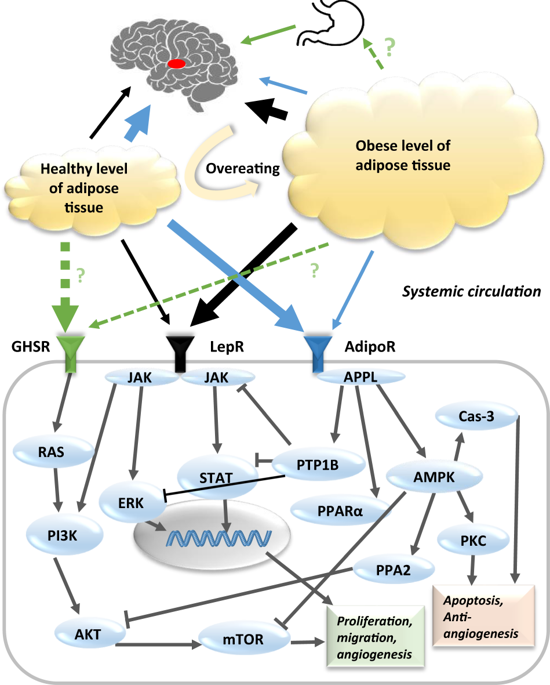当前位置:
X-MOL 学术
›
Prostate Cancer Prostatic. Dis.
›
论文详情
Our official English website, www.x-mol.net, welcomes your
feedback! (Note: you will need to create a separate account there.)
Appetite-regulating hormones-leptin, adiponectin and ghrelin-and the development of prostate cancer: a systematic review and exploratory meta-analysis.
Prostate Cancer and Prostatic Diseases ( IF 5.1 ) Pub Date : 2019-05-30 , DOI: 10.1038/s41391-019-0154-1 Charlotte Zoe Angel 1, 2 , Isabel Iguacel 1, 3 , Amy Mullee 1, 4 , Neela Guha 1, 5 , Rachel Wasson 1 , Declan J McKenna 2 , Marc J Gunter 1 , Vitaly Smelov 1 , Inge Huybrechts 1
Prostate Cancer and Prostatic Diseases ( IF 5.1 ) Pub Date : 2019-05-30 , DOI: 10.1038/s41391-019-0154-1 Charlotte Zoe Angel 1, 2 , Isabel Iguacel 1, 3 , Amy Mullee 1, 4 , Neela Guha 1, 5 , Rachel Wasson 1 , Declan J McKenna 2 , Marc J Gunter 1 , Vitaly Smelov 1 , Inge Huybrechts 1
Affiliation

|
BACKGROUND
Obesity has been proposed as a risk factor for prostate cancer (PCa). In obesity, serum levels of the appetite-regulating hormones-leptin, adiponectin, and ghrelin-become deregulated.
OBJECTIVE
To explore whether serum levels of appetite-regulating hormones associate with the incidence of PCa, the incidence of advanced disease, or PCa-specific mortality.
METHODS
PRISMA guidelines were followed. A systematic search for relevant articles published until March 2019 was performed using the databases PubMed, EMBASE, and Web of Science. Observational studies with data on serum levels of leptin, adiponectin, or ghrelin and PCa outcome were included. Meta-analysis was used to combine risk estimates. Meta-relative risks (mRRs) were calculated using random effects models. When available, raw data was pooled. Publication bias was assessed by funnel plot and Begg's test.
RESULTS
Thirty-five studies were eligible for inclusion. The qualitative analysis indicated that leptin was not consistently associated with any PCa outcome, although several cohorts reported decreased adiponectin levels in men who later developed advanced PCa. Based on the meta-analysis, there was no significant effect of leptin on PCa incidence (mRR = 0.93 (95% CI 0.75-1.16), p = 0.52) or advanced PCa (mRR = 0.90 (95% CI 0.74-1.10), p = 0.30). There were insufficient studies to estimate the mRR of PCa incidence for men with the highest levels of adiponectin. The combined risk of advanced PCa for men with the highest levels of adiponectin was reduced but did not reach significance (mRR = 0.81 (95% CI 0.61-1.08), p = 0.15).
CONCLUSIONS
The current evidence does not suggest an association between leptin and PCa outcome. However, there may be an inverse association between adiponectin and the incidence of advanced PCa that should be investigated by further studies. Serum ghrelin has not been largely investigated.
中文翻译:

食欲调节激素——瘦素、脂联素和生长素释放肽——与前列腺癌的发展:系统评价和探索性荟萃分析。
背景肥胖已被提议作为前列腺癌(PCa)的危险因素。在肥胖症中,调节食欲的激素——瘦素、脂联素和生长素释放肽——的血清水平变得失调。目的 探讨食欲调节激素的血清水平是否与 PCa 的发病率、晚期疾病的发病率或 PCa 特异性死亡率相关。方法 遵循 PRISMA 指南。使用 PubMed、EMBASE 和 Web of Science 数据库对 2019 年 3 月之前发表的相关文章进行了系统搜索。纳入了有关瘦素、脂联素或生长素释放肽和 PCa 结果的血清数据的观察性研究。荟萃分析用于合并风险估计。使用随机效应模型计算元相关风险 (mRR)。当可用时,合并原始数据。通过漏斗图和 Begg 检验评估发表偏倚。结果 35 项研究符合纳入条件。定性分析表明瘦素与任何 PCa 结果并不一致,尽管一些队列报告称后来发展为晚期 PCa 的男性脂联素水平降低。根据荟萃分析,瘦素对 PCa 发病率 (mRR = 0.93 (95% CI 0.75-1.16),p = 0.52) 或晚期 PCa (mRR = 0.90 (95% CI 0.74-1.10), p = 0.30)。没有足够的研究来估计脂联素水平最高的男性 PCa 发病率的 mRR。脂联素水平最高的男性患晚期前列腺癌的综合风险有所降低,但没有达到显着性 (mRR = 0.81 (95% CI 0.61-1.08),p = 0.15)。结论 目前的证据并未表明瘦素与 PCa 结果之间存在关联。然而,脂联素与晚期 PCa 的发病率之间可能存在负相关,应该通过进一步的研究来调查。血清生长素释放肽尚未得到广泛研究。
更新日期:2019-11-18
中文翻译:

食欲调节激素——瘦素、脂联素和生长素释放肽——与前列腺癌的发展:系统评价和探索性荟萃分析。
背景肥胖已被提议作为前列腺癌(PCa)的危险因素。在肥胖症中,调节食欲的激素——瘦素、脂联素和生长素释放肽——的血清水平变得失调。目的 探讨食欲调节激素的血清水平是否与 PCa 的发病率、晚期疾病的发病率或 PCa 特异性死亡率相关。方法 遵循 PRISMA 指南。使用 PubMed、EMBASE 和 Web of Science 数据库对 2019 年 3 月之前发表的相关文章进行了系统搜索。纳入了有关瘦素、脂联素或生长素释放肽和 PCa 结果的血清数据的观察性研究。荟萃分析用于合并风险估计。使用随机效应模型计算元相关风险 (mRR)。当可用时,合并原始数据。通过漏斗图和 Begg 检验评估发表偏倚。结果 35 项研究符合纳入条件。定性分析表明瘦素与任何 PCa 结果并不一致,尽管一些队列报告称后来发展为晚期 PCa 的男性脂联素水平降低。根据荟萃分析,瘦素对 PCa 发病率 (mRR = 0.93 (95% CI 0.75-1.16),p = 0.52) 或晚期 PCa (mRR = 0.90 (95% CI 0.74-1.10), p = 0.30)。没有足够的研究来估计脂联素水平最高的男性 PCa 发病率的 mRR。脂联素水平最高的男性患晚期前列腺癌的综合风险有所降低,但没有达到显着性 (mRR = 0.81 (95% CI 0.61-1.08),p = 0.15)。结论 目前的证据并未表明瘦素与 PCa 结果之间存在关联。然而,脂联素与晚期 PCa 的发病率之间可能存在负相关,应该通过进一步的研究来调查。血清生长素释放肽尚未得到广泛研究。











































 京公网安备 11010802027423号
京公网安备 11010802027423号